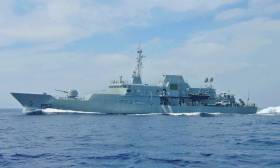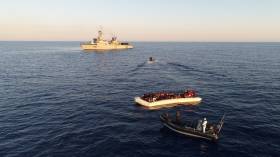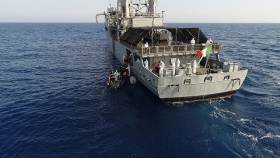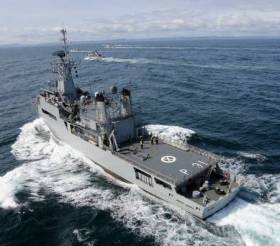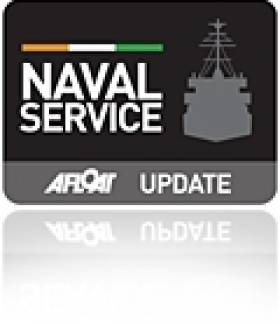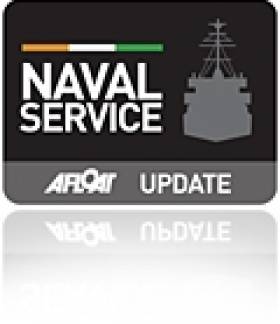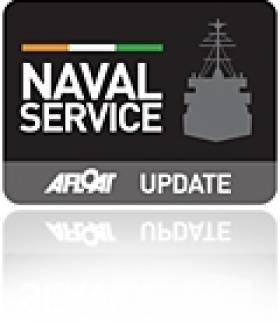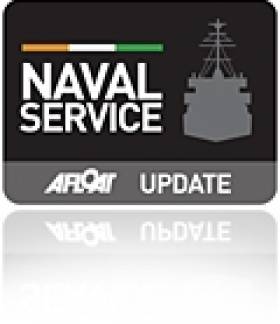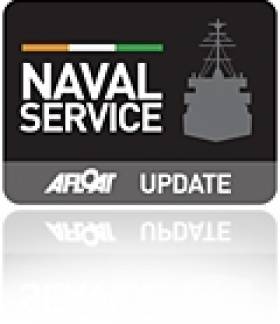Displaying items by tag: LE Eithne
Naval Service Vessels Kept At Base Due To Crew Shortages
#Navy - According to The Irish Times, two Naval Service vessels were prevented from leaving their Haulbowline base last week due to crew shortages.
The LÉ Orla and LÉ Niamh were both kept at their docks while reserve members were drafted to cover shortages on the flagship LÉ Eithne.
Last week’s situation — linked to a reduced level of personnel retention — is a symptom of a bigger problem within the Defence Forces, The Irish Times reports, with one lieutenant colonel saying the command structure “is breaking down”.
The Irish Times has much more on the story HERE.
Naval Service Rescues Over 180 Refugees in the Mediterranean
#Refugees - LÉ Eithne of the Irish Naval Service writes the Journal.ie has rescued approximately 183 people yesterday (25 June) in the Mediterranean Sea, just north of the Libyan capital Tripoli.
While on patrol at around 6 am, the LÉ Eithne located and rescued 113 refugees from an inflatable craft 40km north-west of Tripoli.
The crew on the ship then identified another craft in distress, and a second rescue operation was launched.
A further 70 people were rescued from this boat.
There are currently 183 on board the LÉ Eithne and the Irish vessel is enroute to assist in another rescue operation in the region.
Rescue of 346 Migrants by LÉ Eithne off Libya
#RefugeeRescue- Following a request from the Italian Maritime Rescue Co-Ordination Centre, LÉ Eithne yesterday located and rescued a total of 135 migrants off Libya.
The migrants were found on an inflatable craft approx 83Km off the north-west coast of Tripoli.
The LÉ Eithne was subsequently appointed on scene coordinator by the Italian Maritime Rescue Co-Ordination to coordinate the rescue efforts of 3 NGO vessels dealing with 10 platforms in distress (PIDs).
The Naval Service flagship has now completed a second and third rescue of 211 migrants from two further inflatable craft, as well as taking 85 migrants on board from one of the NGO ships.
On board are 431 migrants (346 rescued, 85 transferred from NGO vessel) and is proceeding to two further PIDs, while also coordinating the NGO ships.
The migrants on board received food water and medical treatment where required.
#EithneToMed - Patrol vessels of the Naval Service will be deployed for a third summer of humanitarian operations in the Mediterranean.
As Independent.ie writes the Naval Service flagship, LE Eithne, has been assigned to begin the rotation of three ships in the Mediterranean on rescue operations for migrants attempting to reach Europe from North Africa.
It had been expected that the 33 year old vessel would depart Haulbowline Naval Base in Cork on May 1 but that departure was rescheduled pending final Government approval and will depart tomorrow.
Defence Minister Paul Kehoe will wish the vessel and 72-strong crew under Captain Brian Fitzgerald well as they depart Haulbowline Naval Base at 11am.
The first deployment under Operation Pontus 2017 will last for three months with two further Naval Service patrol vessels expected to be deployed until next November.
Ireland first dispatched Naval Service vessels to the region in 2015 amid concerns over the number of migrants drowning in the Mediterranean after leaving North Africa, in particular the Libyan coast, on flimsy inflatable craft.
The inflatable craft were totally unsuited to the journey and were almost always dangerously overloaded by ruthless people smugglers.
Hundreds of migrants have drowned as a result.
LE Eithne completed a previous deployment to the Mediterranean alongside other Irish patrol vessels including LE James Joyce, LE Samuel Beckett and LE James Joyce.
Irish crews work under the direction of the Italian Navy and Coastguard.
For much more on the story, the newspaper has more to report by clicking here.
#MigrantMission - Flagship LE Eithne of the Naval Service is to be deployed again on humanitarian missions in the Mediterranean Sea, so to assist in the ongoing refugee migrant crisis off north Africa, writes Jehan Ashmore.
The 1984 built Helicopter Patrol Vessel unique in the eight-strong navy was equipped with such aircraft but earlier in her career, is expected to depart Haulbowline Naval Base, Cork Harbour on 1st May.
In response to Afloat, the Department of Defence issued a statement that said the deployment of LE Eithne is on foot of a Government decision so to enable to assist humanitarian search and Rescue (SAR) operations in the region.
The Department added LE Eithne’s role is subject to finalisation of bilateral arrangements with the Italian authorities on the deployment and operation of the vessel. This will involve LE Eithne on the disembarkation and reception of persons rescued or vessels in distress.
This second deployment of the flagship follows the Defence Forces involvement in ‘Operation Pontus’ last year. This saw three Naval ships and over 150 Naval Service and Army personnel deployed to the Mediterranean in response to the humanitarian crisis supporting the Italian Marine Rescue Co-Ordination Centre with SAR assistance.
During 2016 a total of 7,029 migrants alone were rescued. Since the Naval Service began such missions in recent years more than 15,000 people have been saved.
The role of the navy in humanitarian operations was recognised recently when an Honorary ‘Freedom of Entry to the County’ was bestowed to the Naval Service from Dun Laoghaire-Rathdown County Council last month. Crew from the flagship that docked in its adopted homeport attended the ceremony.
Irish Navy Pick Up Suspected Med Trafficker
#MedTrafficker - The LE Eithne has picked up a suspected people smuggler amongst 646 desperate migrants has been arrested by Italian Police.
Bairam Ltayef (24), a Tunisian national, was detained in the Sicilian capital Palermo after he was identified by refugees who were interviewed by officers.
It is understood that the crew of the LE Eithne were unaware that the man was a suspected trafficker.
Drowned
It is estimated that at least 1,850 people have drowned in the Mediterranean this year alone, with many falling victim to people traffickers in their desperation to flee war and poverty in the Middle East and Africa.
The State Police told the Herald that they "identified and arrested" Mr Ltayef on suspicion that he was the "smuggler" of a boat of migrants.
A statement explained how the LE Eithne arrived in Palermo on June 30 to offload the migrants, with the Italian police meeting the vessel to assist in the processing of the immigrants.
For more on this development, the Herald.ie has a report here.
Government Ministers Meet Crew of L.É. Eithne in Malta
#EithneMalta - Minister for Defence, Simon Coveney, T.D. earlier today met Naval Service personnel crew of the L.É. Eithne (P31) in Valetta, Malta.
The flagship under the command of her captain, Commander Pearse O'Donnell and his crew are continuing to undertake a key role in assisting the Italian authorities with the migrant crisis in the Mediterranean.
The Minister is accompanied on his visit by Minister for Justice & Equality, Frances Fitzgerald, T.D. and Minister of State for Development, Trade Promotion and North-South Co-operation, Sean Sherlock, T.D.
Minister Coveney said" The recent rescue operations undertaken by the Irish Naval vessel and her crew to date have impacted significantly on the lives of so many people. Up to 30 June 2015, you have rescued 3,376 migrants in 22 rescue missions".
The Minister added "The work of our Naval Service in the Mediterranean is invaluable. The Naval Service will remain in the Mediterranean undertaking humanitarian search and rescue activity. L.É. Niamh (P52) will replace L.É. Eithne over the next week or so." The Minister went on to say "Ireland's focus will remain on continuing to assist the Italian authorities in the humanitarian search and rescue operation efforts to prevent further tragedy and loss of life at sea."
Minister Fitzgerald said "I am delighted to have the opportunity to pay tribute to the exemplary professionalism of the crew of the LÉ Eithne in humanitarian search and rescue. We are proud of them and the work they are doing under the Irish flag".
Minister Fitzgerald went on to say "Migration is one of the biggest challenges facing the EU and there are no easy answers. However Ireland is committed to doing its part in solidarity with our fellow Europeans in tackling that crisis. The deployment of LÉ Eithne shows the real difference that Ireland, as a comparatively small Member State, can make and we will continue to do what we can when we can as the situation evolves".
Minister of State Seán Sherlock added "the heroic work of our Defence Forces in this exercise has been humbling."
"The displacement caused by protracted conflict has had a devastating impact on the families who have had to flee their homes and communities. Many of these very vulnerable people have fled war and persecution to seek refuge here in Europe. Ireland is making a significant contribution to addressing the root causes of displacement in countries of origin, notably through our humanitarian and development assistance in the Horn of Africa and other regions of Africa and the humanitarian support which we provide in Syria and the region."
Minister Coveney concluded "on behalf of myself and the Irish Government, I would like to thank you all for your outstanding work in the Mediterranean to date. I wish you every success for the future and a safe return to your families."
Naval Service Rescues More Migrants
#EithneMedCrisis - In operations that took place in two separate incidents writes The Belfast Telegraph, about 50 miles north-west of the Libyan capital Tripoli, men, women and children were taken off two wooden barges.
The crew of the LE Eithne (P31) took part in the first search and rescue after transferring a group of 593 migrants to HMS Bulwark (L15).
The first rescue started at about 8am Irish time when 330 people were safely taken from a barge and immediately afterwards the crew was tasked to assist with another rescue of 317 migrants on another barge.
The migrants included 544 men, 95 women and eight children, the Naval Service said.
Government to Deploy L.É. Eithne to Assist in Humanitarian Crisis in the Mediterranean
#EithneMedCrisis - Minister for Defence, Simon Conveney, T.D. has been given approval by the Government today (12 May) for the deployment of a Naval Service vessel to undertake humanitarian search and rescue missions as previously reported on Afloat.ie in the Mediterrranean.
The last Irish built naval service vessel L.E.Éithne (P31) dating from 1984 whose career was also previously reported will have a crew of around 65 personnel of the Permanent Defence Force are to undertake the task. The decision is subject to finalisation of appropriate arrangements with the Italian authorities.
Following the Government Decision the Minister commented "subject to finalisation of arrangements with the Italian authorities, the L.É. Eithne will be despatched to the Mediterranean without any delay. Operational and logistics planning for the deployment have been completed and the 80m vessel which has a range of 7,000nm at 15 knots is ready to deployed. The humanitarian crisis in the Mediterranean is of great concern to Ireland and to our EU partners. I am anxious that we commence search and rescue activities in the Mediterranean as soon as it is feasible to do so".
The Minister went on to say that "discussions are at an advanced stage with the Italian authorities on arrangements covering a number of issues relating to the deployment of the Vessel. I expect that the Ship should depart the Naval Base in Haulbowline on Saturday, subject to confirmation of the proposed arrangements by the relevant Italian authorities".
Ireland will deploy L.É. Eithne to the Mediterranean for a period of up to six months over the summer period, subject to the operational demands and requirements arising in the theatre of operations, to assist the Italian authorities in the humanitarian search and rescue operations.
The Minister highlighted the Government's commitment to continuing Ireland's strong tradition of peacekeeping and stated that "the proposed deployment of an Irish Naval Service vessel to the Mediterranean will bring the number of Defence Forces personnel deployed overseas to approximately 500 Irish personnel."
Naval Service ‘Flagship’ Visits Adopted Homeport of Flag Festival and Irish Diaspora Forum
#FlagshipsHomeport -With newcomer Dublin Bay Cruises running from the East Pier jetty in Dun Laoghaire Harbour, this led to the Naval Service 'flagship' L.E. Eithne (P31) having to take a different berth than usual at her adopted homeport, writes Jehan Ashmore.
The recent two-day call of L.E. Eithne saw the flagship make the unusual step of berthing at Carlisle Pier, the location chosen by the Dun Laoghaire Harbour Company for a proposed Irish International Diaspora Centre, a landmark building which is to form as a focal point of the port's Masterplan.
L.E. Eithne came alongside (berth No. 3) where the conventional ferry from Holyhead used to dock until 1996. To those of a different generation, memories will recall the 'mail' boats that docked also on the adjacent berth that faces the East Pier. Going back further was the era of the steam-packets that also plied the 60 nautical mile route to Anglesea.
Together these forms of vessels can trace the history of some 200 years of passenger services linking Ireland and Wales, and where Carlisle Pier was the embarkation point for thousands of Irish emigrants who set off to a begin a new life with our nearest neighbour and beyond.
As for the flagship the L.E. Eithne, she has represented the state proudly as a floating ambassador during her near 30 year career. She has visited many shores aboard, notably as the first Naval Service vessel to cross the Atlantic in 1986, where she sailed to the United States visiting Hamilton, New York, and Boston.
Such seafaring voyages that 'fly the flag' strengthen the ties between nations and heightens the importance of history, heritage and the cultural identity of flags and emblems.
On a related note the Genealogical Society of Ireland and the National Maritime Museum of Ireland, are to jointly host The Bratacha Festival of Flags and Emblems 2013 in the museum which is open to visitors free of charge on Friday 10 and Saturday 11 May.
Following the festival, the third Global Diaspora Forum, which is a celebration of the 70m Irish diaspora and is to be held in Dun Laoghaire on 14-15 May.
The forum has been held annually in Washington and, this year, it will run simultaneously in Washington and Dublin: primarily in the Killiney Castle Hotel and Dun Laoghaire County Hall.



























